|
The Greatest Tearjerkers of All-Time
|
|
Title Screen
|
Movie Title/Year and Brief Tearjerker Scene Description |
Screenshots
|

|
Life is Beautiful (1997, It.)
(aka La Vita E Bella)
 #14 #14
 #34 #34
- the life-saving, imaginative illusion and play-acting
that clowning, child-like hotel waiter Guido (Oscar-winning Roberto
Benigni) gave his young son Giosue/Joshua (Giorgio Cantarini) to
shield him from the ugly horrors of a Nazi concentration camp where
they were interned - the fiction that the first prize in the game
they were playing was a brand-new armored tank: ("The first one
to get a thousand points wins. The prize is a tank!")
- Guido's shocking death scene after
he was caught by a soldier during an escape and deliberately clownishly
marched to his execution by machine-gun fire (offscreen) when he
realized his son (hidden in a sweatbox) was watching through a
peep-hole
- the joyous scene in which Giosue was reunited
with his mother Dora (Nicoletta Braschi) after American troops
liberated the camp, thinking he'd won the "game"
|




|

|
The Lion, The Witch & The
Wardrobe (1979) (TV)
- the cruel torture/sacrifice of the saintly lion Aslan
(voice of Stephen Thorne) at the Great Stone Table by Jadis, the
White Witch (voice of Beth Porter), as her evil minions taunted,
stoned, shaved and muzzled the lion before the Witch stabbed him
with a dagger.
[Note: This scene was memorably redone in the live-action
version The
Chronicles of Narnia: The Lion, the Witch and the Wardrobe (2005).]
|



|

|
The Lion King (1994)
- the extremely sad scene of the cruel death of "Lion
King" ruler Mufasa after rescuing young son Simba from a large
stampeding herd of wildebeests (the disastrous stampede was engineered
by Mufasa's wicked, power-hungry brother Scar and the hyenas), and
then falling to his death from a rock cliff to the valley floor far
below when Scar wouldn't help him up. Instead, Scar pierced Mufasa's
paws with his own claws, sarcastically exclaimed: "Long live
the king", and tossed him off
- afterwards, Simba vainly attempted
to awaken his father, shed some tears, and then cuddled up next to
him. Adding to Simba's misery, Scar led him to believe that he was
responsible for his father's death, told him to run away, and then
ordered his three hyena cohorts to kill Simba.
|
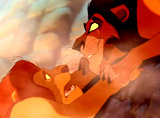



|
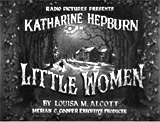
|
Little Women
(1933)
 #40 #40
- the reassuring words of dying Beth
March (Jean Parker) to her older sister Jo (Katharine Hepburn): ("I'm
not afraid anymore! I'm learning that I don't lose you, that you'll
be more to me than ever, and NOTHING can part us, though it seems
to. Oh, Jo! I think I'll be homesick for you - even in heaven")
- Jo's written ode to her sister titled "My Beth": ("Oh
my sister, passing from me / Out of human care and strife / Leave
me, as a gift those virtues / Which have beautified your life / By
that deep and solemn river / Where your willing feet now stand")
- Beth's last words: ("I
think I can sleep now. Oh look, Jo. My birds. They got back in time")
- at the moment of her death when the birds fly off from the window
sill.
|



|

|
The Lives of Others (2006, Germ.) (aka Das Leben der Anderen)
- the scene in which beautiful actress Christa-Maria Sieland (Martina Gedeck) - the devoted lover of successful Socialist playwright Georg Dreyman (Sebastian Koch) cleansed herself in the bathtub/shower of the filth (both physically and emotionally) after a forced sexual encounter with Cultural Department head Minister Bruno Hempf (Thomas Thieme) in the backseat of his limousine, in exchange for prescription drugs and protection
- the heart-breaking scene in which a distressed
Christa-Maria committed suicide by running in front of a truck after
she believed that she had betrayed Dreyman by revealing the location
of his incriminating red-ribboned typewriter that he had used to
author an anonymous article (ironically about suicide in East Germany)
for West German magazine Der Spiegel - made more tragic by
the fact that sympathetic "guardian angel" secret police Stasi survelliance agent Hauptmann Gerd Wiesler (Ulrich Mühe) had just before secretly removed the typewriter from under the apartment's doorsill to protect her and Dreyman - and the scene of Georg's anguish over her bloody death in the street
- the scene in which a demoted Wiesler quietly
walked out of his dead-end mail-steaming job nearly 5 years later
when the Berlin Wall came down in 1989
- the sequence in
which Georg discovered that Wielser had protected him when he read
the declassified surveillance transcripts on himself, and discovered
a thumbprint smudge of red ink (from the red-ribboned typewriter)
next to his official notation HGW XX/7. Then, he located Wiesler
(now a newspaper deliveryman) but decided not to introduce himself
to the humbled man
- the final scene two years later when Wiesler
saw a bookstore poster advertising a new book written by Dreyman
titled "Sonata For a Good Man" and its dedication: "HGW
XX/7 gewidmet, in Dankbarkeit. (Dedicated to HGW XX/7, in Gratitude)"
- the film's final line - Wiesler's subdued, double-entendre
reply to the cashier's question if he'd like the book he was purchasing
gift-wrapped: "No,
it's for me."
|


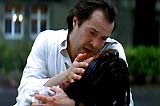


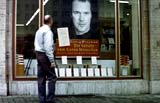

|
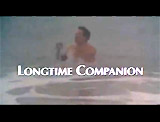
|
Longtime Companion (1990)
 #6 #6
- the character of David (Bruce Davison),
the lover of a deteriorating AIDS patient and 'longtime
companion' - soap opera scriptwriter Sean (Mark Lamos), and his
loving, calm and reassuring advice to his dying partner: "It's
OK, you can go. Let
go now, baby. It's all right. Don't be afraid. I'm here...You
let go of everything. Don't hold on...Let go. Just relax, let everything
go. Let go. Let go...I know you're tired. Just let go. I've got ya.
Now nothin' bad's gonna happen. Let go of everything. Don't worry.
Let go. All your pain. Just let it all go. Just let go. There you
go."
- the famous and poignant closing "Fire Island
Fantasy" in which the three surviving friends Willy (Campbell
Scott), Alan/Fuzzy (Stephen Caffrey) and Lisa (Mary-Louise Parker)
strolled on an empty Fire Island beach, and imagined a time in the
future when AIDS had ended; Willy wistfully mused: ("It
seems inconceivable, doesn't it... there was ever a time
before all this, when we didn't wake up every day wondering who's
sick now, who else is gone?...I just
want to be there if they ever do find a cure"), as bluegrass singer
Zane Campbell's haunting Post-Mortem Bar was heard in
the background
- the heart-breaking fantasy
of the joyous reunion/party of the three survivors, watching as they
saw loved ones and friends they'd lost running torward them on the
beach; in the fantasy, all of the dead
reverted back to their healthy selves for a few moments and were
greeted by the threesome before cutting back to them on
the beach, when Willy repeated: "I just want to be there" -
the film's last line
|
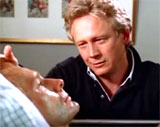



|

|
The Lord of the Rings: The Return
of the King (2003)
- the farewell finale, in which
weary and damaged hobbit Frodo Baggins (Elijah Wood), after succumbing
to the One Ring's evil influence atop Mount Doom (where he destroyed
the Ring) left Middle-Earth with his uncle Bilbo Baggins (Ian Holm),
who was reaching death from old age. He was also accompanied in the
goodbye scene by wizard Gandalf (Ian McKellen), who bid farewell
to the rest of the Fellowship (Frodo's three Hobbit friends), and
then told Frodo: "It
is time, Frodo", before departing with him for the Grey Havens
(the elves' Undying Lands)
- the scene was highlighted by Frodo's explanation
to his best friend and companion Sam Gamgee (Sean Austin) about why
he was leaving: "We set out to save the Shire, Sam. And it has
been saved. But not for me." Sam begged: "You don't
mean that! You can't leave!" Frodo presented Sam with his handwritten
book of The Lord of the Rings story: "The last pages
are for you, Sam." After hugging Merry (Dominic Monaghan) and
Pippin (Billy Boyd), Frodo kissed Sam on the forehead, then boarded
the vessel and gave one final look back. Afterwards, Sam returned
home to his Shire family as he remembered what Frodo had written
him: (voice-over) ("My dear Sam: you cannot always be
torn in two. You will have to be one and whole for many years. You
have so much to enjoy and to be, and to do. Your part in this story
will go on")
|



|

|
Love, Actually (2003, UK/US)
 #90
#90
- the Christmas morning gift-unwrapping scene in this
sentimental tearjerker in which Karen (Emma Thompson) received a
Joni Mitchell CD for Christmas from her straying husband Harry (Alan
Rickman), instead of the expensive necklace she discovered in his
pocket
- when she retreated to her bedroom, she
realized tearfully as she listened to Mitchell's "Both
Sides Now" (Track 7), and glanced at family photos on her dresser
that Harry was having an affair with his seductive secretary Mia (Heike
Makatsch) - (an inset sequence showed Mia trying on the necklace).
After weeping silently, Karen forced herself to put on a happy face
after wiping away her tears when she returned from her bedroom to rejoin
her family in the living room
|




|
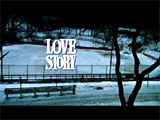
|
Love Story
(1970)
 #17 #17
 #78
#78
- the scene in which Radcliffe
music student Jennifer Cavalleri (Ali McGraw) made the famous statement
to WASP Harvard law student Oliver Barrett IV (Ryan O'Neal) after
they had a fight and he apologized, but she cautioned: ("Don't.
Love means never having to say you're sorry")
- Jennifer's discovery that
she was terminally ill ("very sick")
while she was being medically tested for fertility and pregnancy:
("She's dying").
- and then her lengthy deathbed conversation
with Oliver at the Mount Sinai Hospital in a tear-inducing closing.
She told him: ("It doesn't hurt, Ollie, really it doesn't. It's
like falling off a cliff in slow-motion, you know. Only after a while,
you wish you'd hit the ground already, you know"). He stated
he fell off a cliff when he met her. Then, she tried to bring up
his spirits: ("Now you've gotta stop being sick...that guilty
look on your face, it's sick. Would you stop blaming yourself, you
god-damn stupid preppy? It's nobody's fault. It's not your fault.
That's the only thing I'm gonna ask you. Otherwise, I know you're
gonna be OK. (pause) Screw Paris!...Screw Paris and music and all
that stuff you thought you stole from me. I don't care, don't you
believe that? (He shook his head no) Then get the hell out of here.
I don't want you at my god-damn deathbed"). He finally admitted:
("I
believe you. I really do"). She responded with a last request:
("That's
better. Would you please do something for me, Ollie? (He kissed her
hand) Would you please hold me? (He half-heartedly hugged her) No,
I mean really hold me. Next to me.") He reclined next to her
on the bed.
- afterwards, in the hallway, Oliver spoke to Jenny's
father Philip (John Marley), who said with a choked-up voice: ("I
wish I hadn't promised Jenny to be strong for you"). As he left
the hospital, Oliver ran into his father Oliver Barrett III (Ray
Milland), who asked: ("Why didn't you tell me? I made a couple
of calls, and as soon as I found out, I jumped right in the car.
Oliver, I want to help.") His son simply replied: "Jenny's
dead." When
his father began to reply: "I'm sorry...", Oliver interrupted
him and quoted his late wife's earlier remark, when referring to
their past misunderstandings: ("Love, love means never having
to say you're sorry") - the last line of film dialogue
- for the
remaining three minutes in the touching finale, Oliver walked across
the street to snow-covered Central Park as the poignant, award-winning "Love
Story" theme music built up and played and he contemplated what
life would have been like with Jenny, while sitting on a bench. The
camera pulled away from him, shot from behind, before the closing
credits.
|







|
















































